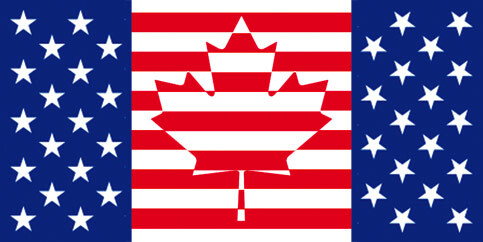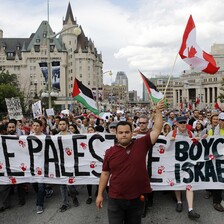The Electronic Intifada 3 November 2008

(EI Illustration)
People around the world, including those in the Middle East, may have paid little attention to Canada’s parliamentary elections on 14 October. This should come as no surprise, as Canadians themselves seemed more interested in the developments of the presidential race for the White House south of the border. Besides, the Canadian election brought little change to the makeup of parliament. The Conservatives maintained their lead and formed a minority government while the Liberals lost more seats.
But preserving the status quo and the virtual absence of foreign policy as a topic of public debate in the run up to the vote reinforces the transformation in Canada’s geopolitical role in relation to the Middle East. And this must be of extra concern today. Canada may take on an increasingly active role in light of the partial weakening of the United States’ ability to maintain its hegemonic status across the globe single-handedly following its invasions of Afghanistan and Iraq. This is especially so if Barack Obama becomes president. Canada is among the nations with the largest military presence in Afghanistan. The Conservatives led by George W. Bush’s protege Stephen Harper have always pushed for a more aggressive role by Canada at a time when the anti-war movement is on the wane. Harper’s policy is more likely to sit well with the public if it is marketed in line with the “moderate” vision of an American president like Obama who doesn’t have Bush’s bad reputation and who has expressed a desire to shift the war effort from Iraq to Pakistan and Afghanistan.
The fact is Canada’s current role in aiding American expansionism in the Middle East is larger and more complex than what some might think. This role simply became more evident when Canada led the international occupying forces in the Afghani province of Kandahar. This coincided with a gradual shift towards the militarization of foreign policy in opposition to the (at least official) policy of focusing on peacekeeping and diplomacy. And this shift was adopted by the Liberals and Conservatives alike. In 2005, the Liberals promised to increase the military budget by 13 billion dollars (all Canadian figures) over five years. In 2006, the Conservatives came to power. They announced a 2 percent annual increase in military spending over 20 years in addition to a package of 15 billion dollars aimed at buying new equipment and weaponry. With a military budget of 18 billion, Canada ranks sixth among NATO countries when it comes to military spending and jumped to sixth place worldwide in terms of military exports.
However, Canada’s role in aiding the American project isn’t limited to Afghanistan. For despite the official decision not to join the American invasion of Iraq in 2003, Canadian forces took on several major tasks during the operation and after. This included logistical missions (transportation of provisions, heavy machinery, securing of supply lines), training by Canadian federal police of their Iraqi counterparts in Jordan, and even taking on leadership positions among the troops (Canadian generals such as Peter Devlin held top positions). Former US ambassador to Canada Paul Celluci confirmed the extent of Canada’s complicity when he pointed out during the invasion in March 2003 that “ironically, Canadian naval vessels, aircraft and personnel … will supply more support to this war in Iraq indirectly … than most of those 46 countries that are fully supporting our efforts there.”
The militarization of Canada’s foreign policy was accompanied by the reshaping of the armed forces ideology that produced the phenomenon of the army’s former Chief of Staff Rick Hillier. Hillier became a popular face in the media and took on a role similar to that of American Generals David Petraeus and Tommy Franks as a trusted source of authority untainted by political ambition.
Canada’s position vis-a-vis the Arab Israeli conflict was no less extreme. Canada’s increasing support for Israel is on the rise. The Canadian government was the first among Western powers to cut aid to the Palestinian government following the election of Hamas. The suffocating siege on Gaza did not prevent one of the Liberal’s leading candidates for the election, Ken Dryden, from calling to “stop all aid that flows into Gaza” even though it might hurt the Palestinian population.
In relation to Lebanon, Prime Minister Harper described Israel’s aggression against Lebanon in 2006 as a “measured response” while Hizballah’s military and political wing joined the list of terrorist organizations a few years prior.
Domestically, consecutive governments have failed to live up to their minimal obligations towards the country’s citizen of Muslim origin when it comes to the so-called “war on terror.” Recent laws have given the Minister of Immigration more say in determining status of visa application, a move interpreted by immigrant activists as undermining transparency and opening the door for ethnic and racial profiling of applicants. Moreover, Canada is the only western country allied to the US that has failed to repatriate its citizen from Guantanamo. A video released this year showed how Canadian diplomats were implicated in the torture of the Canadian detainee, Omar Khadr. The release of the video did not lead to the public uproar that Khadr’s lawyers had hoped. This last detail sheds some light on the gap between the gravity of the shift in Canada’s policy and the public’s awareness and acknowledgment of such a shift. The image of Canada as an international peace keeper remains the dominant one among the public imagination. Not that Canada abided by such a peacekeeping role throughout its history. Indeed, the country has stood by the US in many of its imperialist endeavors, from the Korean War in the 1950s to regime change in Haiti and later in Afghanistan. But often, it was never as aggressive in its approach as the US, and it did show some concern for international law and multilateral diplomacy. That is what is eroding.
All this shows that it is misguided to treat Canada as a moderate force. Canada today squarely belongs to the neo-conservative US camp. And this is the message that politicians, diplomats, and activists opposed to US foreign policy in the region need to convey to their Canadian counterparts in an effort to reverse this shift. Anything less is worthy of blame and possibly prosecution.
Hicham Safieddine is a Lebanese Canadian journalist. This is an edited translation of an article that appeared in Lebanon’s Al-Akhbar newspaper on Thursday, 23 October 2008.





